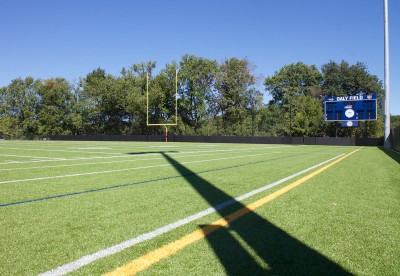
The Brighton High School football team has not played a home game at their own field in over 25 years — until Friday night, when the team tiptoed onto a shiny, organic solution: a refurbished, environmentally-friendly Daly Field athletic complex, located at Simmons College.
Since the late 1980s, Daly Field had been unusable due to a lack of funding and interest, according to Jeremy Solomon, a spokesperson for Simmons. Teams had to resort to playing at Cassidy Field in Cleveland Circle, which limited the team’s capabilities, according to a press release from Simmons.
The new seven-acre complex, according to the release, has a variety of uses, including a NCAA Division III soccer field, six NCAA standard doubles tennis courts, a quarter-mile two-lane walking track, public restrooms and a bicycle and walking path along the Charles River. Additionally, it will be the first home field for Simmons College athletic teams like field hockey or softball.
The excitement over a state-of-the-art athletic complex comes from more than just having a home-field advantage, Solomon said. Daly Field is the only public complex in the New England area that implements organic Geofill, which is made of 100 percent natural fibers, according to its website.
“It’s really quite remarkable,” Solomon said. “We are using synthetic turf, and it doesn’t require any water [to maintain].”
The field poses an interesting question regarding the environmental and health impacts of regular athletic fields, according to Solomon. He said the turf infill is made out of 90 percent coconut shells and 10 percent cork. The unique composition reflects concerns with traditional turf rubber being carcinogenic, Solomon said. He added that while the issue is still under federal investigation, the creation of Daly Field was designed to prioritize the health and safety of athletes.
A water filtration system was also put in place to address runoff in order to protect the Charles River. According Simmons College’s website, a part of the community’s collective mission is to begin “enhancing landscaping and providing storm water management to a neglected area on the banks of the Charles River.” In other words: when it rains, it will no longer flood.
“I know building anything large like this can take a toll on the surrounding environment, but it makes me feel a lot better that the field is so good for the environment,” said Meghan Fontaine, a sophomore at Simmons and field hockey player for the college. “It plays really well.”
Additionally, underneath the turf is a Brock Pad system, which officials hope will reduce the occurrence of concussions by 50 percent, according to the press release.
“[The field] is focused equally on conservation and recreation,” Solomon said.
While praise over the field’s eco-friendly characteristics were abundant, one Boston University professor questioned the effects of the construction of the field on its natural surrounding ecosystem.
“I thought it peculiar that a project of this nature, which touts its environmental assets, didn’t mention at all that it’s next to the Charles River,” said Biology Professor Leslie Kaufman, “because anything you do so close to the river has to take into account either avoiding harm to the river or enriching the value of the river.”
Members of state and local governments also expressed their pride at the Daly Field transformation. In the press release, State Representative Kevin Honan called the project a “public-private partnership.”
“The collaborative effort … [has] transformed Daly Field from an unusable patch of dirt and weeds into an environmentally-sound public space that will benefit the people of Brighton, Watertown neighbors and the Commonwealth for years to come,” Senator William Brownsberger stated in the press release.
Boston Mayor Martin Walsh said he owes the environmental success of Daly Field to the effective partnership between government partners and state entities, according to the press release. In that vein, Solomon said, the success of Simmons’ ground-level approach of eco-friendliness can truly inspire future collaborations between these two groups.
“We felt that at Simmons, we wanted to further our investment to maintain the Boston community,” Solomon said.
The Brighton Bengals beat their opponents, the O’Bryant Tigers, 28-20 on Friday. The cheers continued with fervor as the players walked off the field, Solomon said.
“It’s a big win for Simmons … for this city,” Solomon said.


























































































































